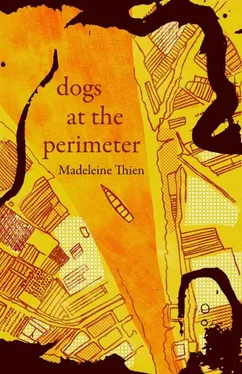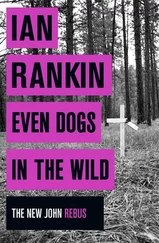They kept him blindfolded all of the time. Once, when they took the blindfold off, they asked him to identify tablets they had found in his bags. The samples were pink, like cotton candy at the Pacific National Exhibition fair grounds, like orchids, a pink that seemed foolish and innocent in this burned, exhausted landscape. “These are vitamins,” he said. He answered them in Khmer and they said he was a spy and he said, “No, I am not.” “Where are you from?” “Japan. Tokyo.” “Where is your passport?” “Lost.” “Why are you here?” “To treat the wounded.” “The wounded?” they said, taunting him. “You mean the Lon Nols, the traitors?” He shook his head vehemently. “I treat the people hurt by American bombs.”
They covered his eyes and returned him to darkness.
With the blindfold on, he felt absurdly safe. They surrounded him: bare feet on the thirsty ground, rifles smartly reloaded, the smell of a campfire. He heard someone getting a haircut, the scissors stuttering like a solitary cricket. He heard a fire starting and water boiling, he ate mushy gruel with his hands, he itched all over from the ants in the dirt, his tongue felt cracked. Night and day, his feet were shackled, he had to piss into a foul bamboo container, he was constipated and everything hurt. He couldn’t believe it was possible to be scared so long, to have his heart solidify in mute fear, and yet to continue day after day.
Sometimes, in his fantasies, he sits at his father’s bedside. The blinds let in whiskers of light and he can see his father’s right hand curled on the sheet, the skin over the knuckles flaccid and pale. He finds the doctors loud and the nurses kind and nobody really looks at him, not even his parents. James tells himself it’s not possible to disappoint the dead. All that matters to the living is the living, that’s what he had tried to explain to Sorya after her brother disappeared: “This is war, not a game. If you have the chance to escape you have to take it. If I go missing, don’t sit around like a fool.” He had felt like a hero when he said this.
But why waste words? Grieving Dararith, she had barely seemed to notice him. She just sat in the apartment thinking and reading, cleaning, cooking, disappearing. She didn’t need his devotion and this independence, her strength, made him feel confused him and shiftless, it made him feel temporary, like an insect clinging to a drain.
Suddenly there were no more planes in the sky and no more shelling. They stopped moving around so frequently. The blindfold was removed and he found himself in a small, square storeroom, or it would have been a storeroom had there been anything on the shelves. It was comfortable enough. The floor had French cement tiles, dirty now, but the design had been lovely once. A short, efficient man came in to give him water, rice soup, and, unexpectedly, a piece of soap. Eventually, the man started to extend his visits. He sat down on the floor and asked James questions about Phnom Penh, the Red Cross, about the war in Vietnam, about food and music and religion, about his wife, about Dararith. They always spoke in Khmer. James would sit with his arms tied behind his back while the man probed him, as if his life story were a confession, as if the two were the same thing.
The man was reedy, dark-skinned, with a way of tapping his knee rhythmically with his fingertips when he spoke. He studied the ground with such intensity that James found himself looking, too, at the tiled floor, taking in the stranger’s soft hands, and then the Kalashnikov laid confidently between them, the barrel of the gun covered by the cadre’s Chinese cap, as if in a decorative flourish.
One morning, the man surprised James. He said, “Let me tell you about someone I once knew. A friend. I was studying at the Lycée Sisowath in Phnom Penh. Do you know it?”
“Everyone knows it.”
The man went on, “This was more than twenty years ago. I lived with another boy, a Chinese-Khmer from Svay Rieng province. Are you familiar with that area?”
“Of course.”
“You’ve been there?”
James nodded.
The man was impressed. “His mother had a petrol stand,” he said, continuing. “The father was dead. The boy, Kwan, drove a lorry and he would give me lifts around the city. He was raising money for his tuition and he worked all the time.”
The man’s face was passive and kind, and it reminded James, disconcertingly, of his mother. His mother, too, had many surfaces, but he’d learned to see between the blinds, behind the clean edges.
“Kwan was trustworthy,” the man said. His voice dropped, not quite a whisper. “Can I tell you that I trusted him more than the friends I went to school with? Those were lazy boys who never worked. Inside their empty heads they didn’t even understand the concept of work. I started to tutor him. He got up very early to drive the lorry but, in the afternoons, when everyone slept, I gave him lessons. He was quick. The thing about Kwan was, he was mute. He could read lips, he could adapt, but he never, ever spoke. I confess, I was fascinated by Kwan. Boys my age were malleable. We swallowed each and every lesson without chewing it first. But Kwan, he was apart. He kept his thoughts to himself and he kept his peace.
“When you first arrived, I was astonished. I said to myself, Maybe Kwan got an education after all! Maybe he paid his way to medical school and made himself a gentleman. I congratulated myself that I, alone, had recognized you.”
In the room, a mosquito buzzed at James’s cheek and he wondered how the insect had found its way into the locked room where there were no windows and the air was stale. It must have come in with the man.
“Are you Kwan?”
“No.”
Generously, the man extended his hand and hushed the mosquito away. “Can you be certain?”
James didn’t know what to say. Now there were insects thrumming nearby, in the ceiling corners they made a sound like a headache. Loose greenery was growing through hairline cracks in the wall, the colour too vivid for this room.
The man nodded, satisfied. “Keep your peace, that’s what I wanted to tell you. Just keep your peace for now.”
He gave James a new set of clothes, trousers and a loose shirt, faded black.
“What is this place?” James asked.
“Once it was a school,” the man said.
James waited for him to continue. The man just looked at him, tranquil, silent.
That night, the rains started. The grass in the wall dripped tiny beads of water. James felt unbearably cold. He remembered, one weekend, taking his brother to the Pacific Ocean. They had caught the ferry across the Strait of Georgia, and then driven the old Datsun to the western edge of Vancouver Island, through the shamelessly fat trees with their towering canopies. His brother, ten years younger, always wanted to hear about Tokyo, but James had little to say. He remembered the bomb shelters and the charred dog he saw once, and the brief sojourns home his father made, and how the war in China had sculpted his father into someone both powerful and empty. His brother waited patiently and James just shrugged and said, “Fuck Japan.” The bottom of the Datsun was rusted through and the floor on the front passenger side had a magnificent hole, you could see the asphalt blurring by: drop something and it was gone forever. How many things had they lost to that gaping hole? His house keys, Hiroji’s plastic watch, apples tumbling from their grocery bags, all sorts of rubbish.
“But one day you’ll take me to Tokyo, right, and show me things.”
“Show you what?” James had said, shrugging. “I’ll introduce you to the girls I knew when I was four.”
He could smell the sea through that hole long before they got there, the salt heaviness, the fresh green-ness of it. He loved the ocean no matter how desperately cold it was. He’d bought a wetsuit, a used one (he’d had no money for a new one) because he was addicted to the fury of the tide. Those currents knocked him back, they overpowered him, and yet he felt alive, not fragmented, not broken. He tried to explain this to Hiroji when they lay, that first night, in their one-season tent.
Читать дальше












